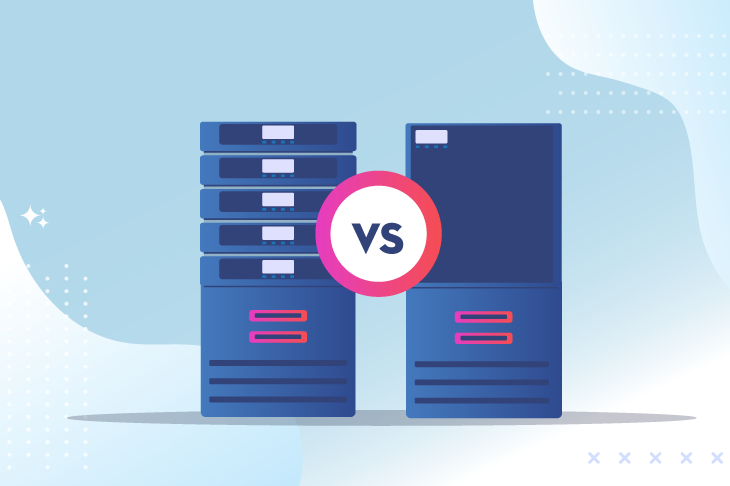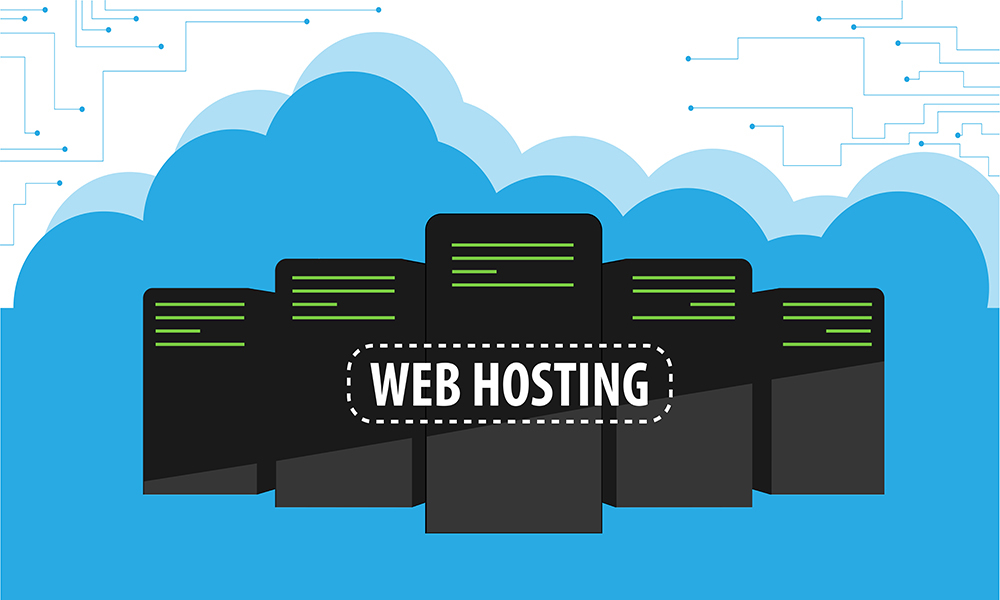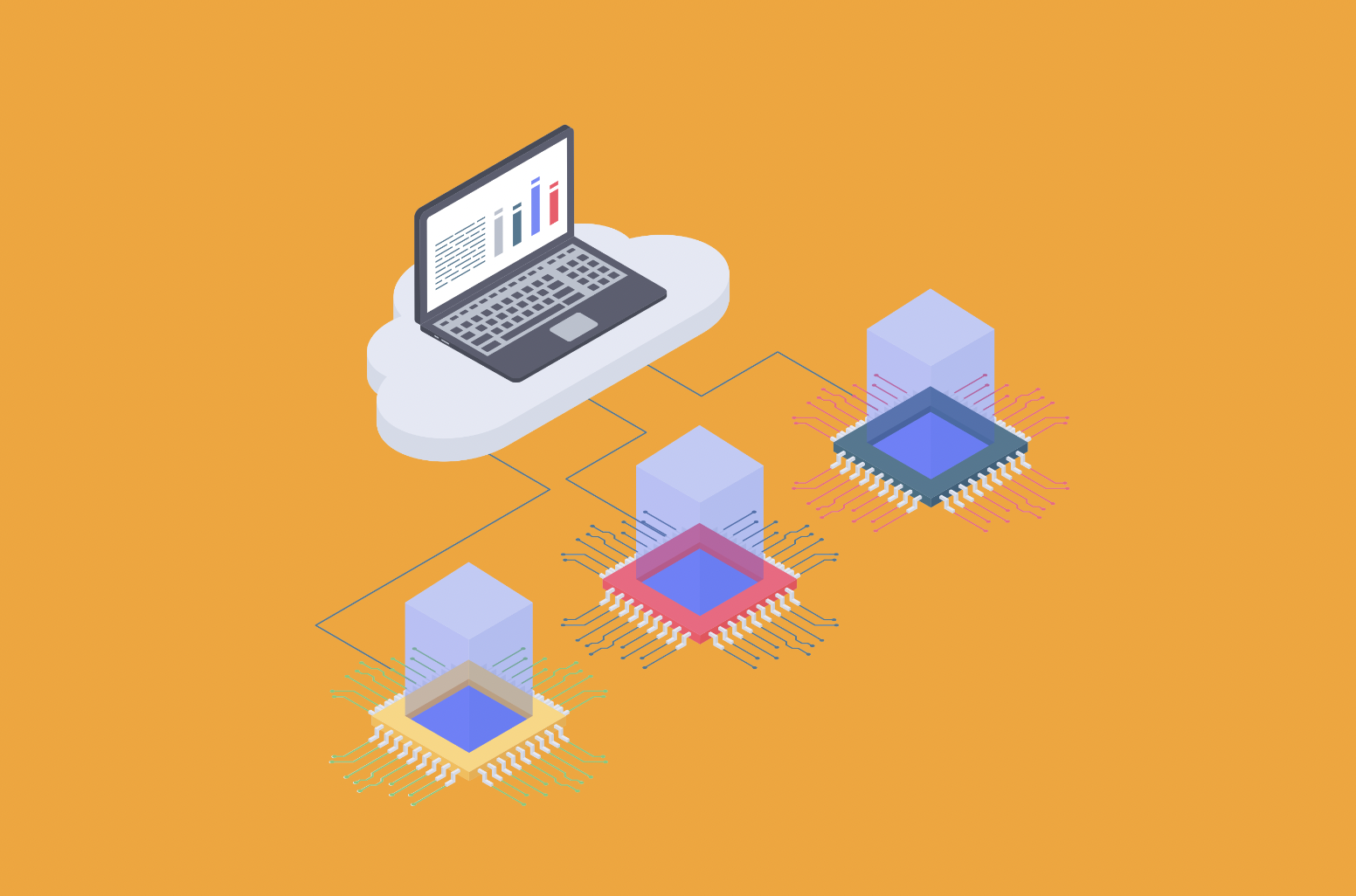In today's digital world, it is imperative to understand what works best for your business. Understanding the differences between a server and hosting can be the first step in deciding which is right for you.
This blog will explore the key differentiators between server and hosting, detailing their individual purpose, functions, and characteristics. By uncovering the unique differences between these two technologies, readers will be better equipped to decide which one is right for their business needs.
Types of Web Hosting
There are several different types of hosting available, and it's super important to decide which one best suits your business.
Shared Hosting: Perfect for beginners, small businesses, and freelancers. Shared hosting is when a website is stored on the same server as multiple other websites. All websites on that server share the same resources such as RAM, CPU cores, and bandwidth. Splitting resources helps keep the cost of shared hosting relatively low.
VPS is the answer for website owners who don’t feel like they need the resource management capabilities of dedicated servers, but are still interested in having more than a single website on their own physical server space. It also lets you host multiple websites on one physical machine without having to pay for multiple machines. The best businesses use VPS hosting to launch new sites or migrate existing ones with ease.
With dedicated hosting, you are the only user on the server. All the resources belong to you, and your website is the only one housed on the server. Dedicated hosting gives site owners maximum control of their servers — they can install any software they like or make upgrades as they see fit — without fear of crashing or affecting other websites hosted on the same machine. Small businesses should take advantage of shared hosting plans because they offer most of the power and flexibility of a VPS or dedicated server — at an affordable monthly rate.
Cloud servers are essentially a more cost-effective version of VPS hosting. With cloud servers, plans come with multiple remote servers, and each of those servers has a different responsibility. This type of host allows for maximum flexibility because you can easily increase your server resources as your business grows. Cloud Servers are essentially a more cost-effective version of VPS hosting. With cloud hosting, plans come with multiple remote servers, and each of those servers has a different responsibility and uses different software to run the network as effectively as possible. The end result is that even under heavy load your site will be running extremely smooth because resources such as RAM, Hard Drive Space, CPU cycles and bandwidth are distributed across multiple systems.

Server vs. Hosting: What's the Difference?
When it comes to the digital world, choosing between server and hosting can be a difficult decision. A server is a computer or device that provides services to other computers and devices connected to a network.
Servers typically contain powerful hardware and software applications that are used for various tasks such as web hosting, email hosting, file sharing, database management, etc. On the other hand, hosting refers to the service of providing physical space on a server for websites or data storage. Hosting companies manage servers in order to provide reliable access for their customers through an internet connection.
The major difference between servers and hosting is that servers are responsible for creating content while hosting provides access to those contents from anywhere around the world.
With each solution offering specific benefits depending on your needs; when deciding which one best suits you both should be considered carefully before investing any money or time into either option. It’s essential that businesses weigh up all options available before making any decisions about their IT environment as getting this wrong could have long-term implications on performance and success
Key Differentiators between Server and Hosting
When considering the differences between server and hosting, one should first look at their individual purpose and functions. At a basic level, servers are responsible for providing data to clients on a network while hosting provides physical space on a server in order to access that data from anywhere around the world.
Servers contain powerful hardware and software applications that allow them to carry out tasks such as web hosting, email hosting, file sharing, database management etc. Hosting companies manage these servers in order to provide reliable access for customers through an internet connection. Additionally, when it comes to security of your data; servers offer additional control over protecting the information stored since they rely less on third-party providers than most host services do.
The second key differentiator between server and hosting is performance capability.
Servers are typically much more powerful than hosted solutions due to their high-end processing power capabilities which results in faster response times with less downtime compared to shared or cloud-hosted services. Furthermore, businesses may also benefit from having greater control over customizing their IT environment if they opt for dedicated servers instead of relying on 3rd party providers or virtual private networks (VPNs).
All of these factors can help ensure maximum uptime and productivity levels while reducing costs long term by avoiding costly downtimes caused by insufficient bandwidth or other issues associated with shared environments.

Server: Purpose, Function, and Characteristics
Server technology is an integral part of the modern digital landscape. A server is a computer or device that provides services to other computers and devices connected to a network.
Servers are powerful and efficient machines, containing both hardware and software applications used for various tasks such as web hosting, email hosting, file sharing, database management etc. Servers provide data to clients on a network and allow users access from anywhere around the world with reliable internet connections.
When it comes to performance capability; servers are much more advanced than hosted solutions due to their high-end processing power capabilities which results in faster response times with less downtime compared to shared or cloud-hosted services.
Additionally, businesses may benefit from having greater control over customizing their IT environment if they opt for dedicated servers instead of relying on 3rd party providers or virtual private networks (VPNs). Furthermore, when considering security of your data; servers offer additional control over protecting the information stored since they rely less on third-party providers than most host services do.
All of these factors can help ensure maximum uptime and productivity levels while reducing costs long term by avoiding costly downtimes caused by insufficient bandwidth or other issues associated with shared environments.
Hosting: Purpose, Function, and Characteristics
Hosting is a critical component of the modern digital landscape. Hosting refers to the physical space on a server where data can be accessed from anywhere around the world with an internet connection.
A hosting provider manages these servers in order to provide reliable access for customers while also providing additional support and maintenance services when needed. This allows businesses to focus their efforts on developing quality content without having to worry about managing or updating hardware or software applications associated with hosting servers.
The purpose of hosting is two-fold: provide access to users and store data securely within a network infrastructure. Hosted solutions offer cost-effective ways of scaling up resources according to user demands, as well as simplifying complex operations such as database management, file sharing, email hosting etc., which can be difficult for non-technical personnel.
Additionally, hosted solutions are often more secure than self-hosted alternatives due to increased levels of encryption and automated backups that occur in most cases; helping protect valuable information from malicious threats or accidental losses caused by human error. Furthermore, many host providers offer additional features such as scalability options and customizable security controls; allowing businesses greater flexibility when it comes to optimizing their IT environment for better performance at lower costs compared other forms of technology investments.

Which One is Right for Your Business?
When it comes to deciding which type of server is right for your business, there are many factors to consider. Servers and hosted solutions both have their advantages and disadvantages depending on the needs of the company. Dedicated servers offer greater control over customizing IT environments while also providing faster response times with less downtime compared to shared or cloud-hosted services. However, these types of servers may require more technical expertise in order to manage them properly, as well as increased upfront costs for hardware investments.
On the other hand, hosting provides a cost-effective solution that is often easier to manage than dedicated servers due to its reliance on third-party providers such as Amazon Web Services (AWS). Hosting solutions can scale up resources according to user demands without additional hardware investments; making it an attractive option for businesses looking for a simpler way of managing their IT infrastructure.
Furthermore, host providers often provide additional features such as customizable security controls which can help protect valuable data from malicious threats or accidental losses caused by human error. Ultimately, when considering which server technology best suits your business needs – careful evaluation is necessary in order determine what will be most beneficial long term in terms of performance capability and cost savings potential.
In conclusion, it is important to determine the purpose and function of both servers and hosting before deciding what is right for your business. Servers are designed to store, process, and manage data while hosting focuses more on publishing content, allowing multiple users to access the resources continuously. Knowing the key differences between each option will help you make an informed decision when determining which product will best meet your needs.
What Is the Difference Between a Server and Hosting?
A Server Is A Computer Or Device That Provides Various Services To Connected Devices. Hosting Is A Service That Provides Physical Space On A Server For Websites Or Data Storage. Basically, a server creates content and hosting allows you to access that content from anywhere in the world.
What is the difference between servers and hosting when it comes to performance?
When it comes to performance, servers and hosting have a lot in common. Servers are known for their top-of-the-line processing power, and they tend to have faster response times and fewer outages than services that are shared or hosted in the cloud. On the other hand, hosting solutions focus on scalability and management, making them more cost-effective and better suited for businesses that have different resource needs.
What are the primary differences between a server and a hosting service in terms of use case and functionality?
A server is a powerful computer that hosts data on a network, such as a web server, email server, or database. This data is then sent to clients on the network. Hosting, on the other hand, is a service that is managed by a provider and focuses on providing a secure and reliable way to access stored data. This type of hosting is ideal for businesses that need a scalable and secure solution.
Which one is right for my business - servers or hosting?
When it comes to servers and hosting, there are a few things to consider. Dedicated servers give you more control, but you may need more technical know-how and pay more in the beginning. On the other hand, hosting solutions, which rely on third party providers, are easy to use and can scale up or down as needed. It’s important to do a thorough analysis of performance capabilities and cost savings potential to decide which option is best for your business.

Nadejda Milanova
An experienced Content creator in the field of Search Engine Optimization (SEO) and WordPress. A true proffesional with a Master's degree focused on journalism.
Read more by Nadejda Milanova





